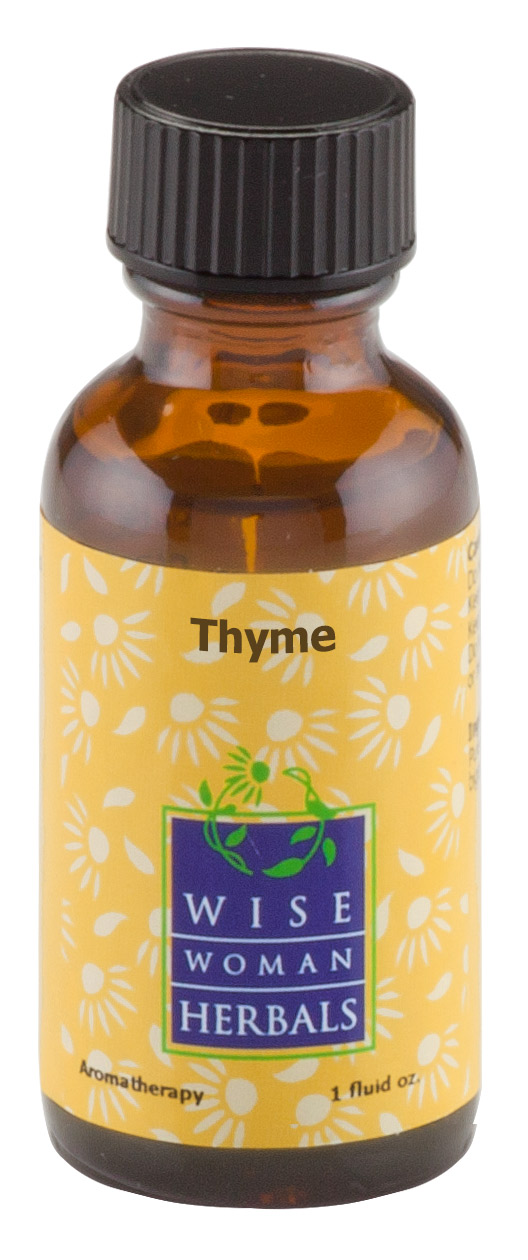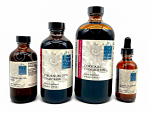Thyme Essential Oil, 1/2 oz

Thyme Essential Oil, 1/2 oz
| SKU | WWH817-.5 | |
| Brand | Wise Woman Herbals | |
| Unit Size | 1/2 oz | |
| Contraindications | Considered very caustic and recommended for external use only. It is a strong mucous membrane irritant. Do not use at more than 1% concentration on mucous membranes. KEEP OUT OF THE REACH OF CHILDREN | |
| Recommendations | Note: Wise Woman Herbals essential oil bottles do not come with reducer tops to control drops. Their high-quality essential oils are pure and non-diluted. Pure essential oils can be highly corrosive to lower density plastic (LDPE) which is what most orifice reducers are made from. |
|
| Description | Habitat: Thymus vulgaris is a strongly aromatic perennial plant that grows close to the ground in dense patches, typically reaching no more than 12 inches in height. It has a woody, fibrous root, numerous narrow wiry stems, and small narrow, hairy, green-grey leaves arranged in opposite pairs. The small attractive flowers may be white, pink or purple according to its geographical location, and they grow in dense clusters. Like many other plants of the Lamiaceae family, Thyme was native to the Mediterranean but has now spread throughout the world and is found growing wild or cultivated abundantly in Algeria, China, France, Portugal, Italy, Israel, Morocco, Spain, Russian Federation, Tunisia, Turkey and USA. Aroma: Thyme Essential Oil smells fresh, herbaceous and slightly medicinal. Feeling mentally fatigued? Add Thyme essential oil to your favorite diffuser blend to get your mental wheels spinning. Thyme oil has a stimulating aroma and promotes a sense of alertness. Affinities: The Thyme plant is high in thymol. The powerful combination of chemicals in Thyme Essential Oil provide a cleansing and purifying effect on the skin; however, because of the prominent presence of thymol, Thyme Oil should be diluted with a carrier oil before application. Thymol is a powerful antiseptic and is extensively used to medicate gauze and wool for surgical dressings. It is therefore preferable as a dressing and during recent years has been one of the most extensively used antiseptics. Folklore: Historically, fresh and dried Thyme as well as the essential oil have been used to help ward off bacteria and viruses. The name is derived from the Greek word 'thymos' that means vitality, courage, or spirit, and was used as an incense in Greek temples. The Egyptians used it in their embalming process and during the Middle Ages it was given to jousting knights for courage. Words of wisdom: Caution to those who have hypersensitive, diseased or damaged skin, or are under 2 years of age. Do not take any oils internally and do not apply undiluted essential oils or other concentrated essences onto the skin without advanced essential oil knowledge or consultation from a qualified aromatherapy practitioner. Use caution when using oils with children and pets. Consult a qualified aromatherapy practitioner before using oils with children, the elderly, during pregnancy, or if you have medical issues or are taking medications. “Thyme Essential Oil Uses and Benefits: AromaWeb.” Aromatherapy and Essential Oil Information, www.aromaweb.com/essential-oils/thyme-oil.asp. “Thyme Essential Oil.” Quinessence, 31 May 2019, www.quinessence.com/blog/thyme-essential-oil. “Thyme, Garden.” A Modern Herbal | Thyme, Garden, www.botanical.com/botanical/mgmh/t/thygar16.html. Tisserand, Robert, and Tony Balacs. Essential Oil Safety. Churchill Livingstone, 2000. Additional Resources: |
|
| Ingredients | Pure essential oil of Thymus vulgaris. | |








